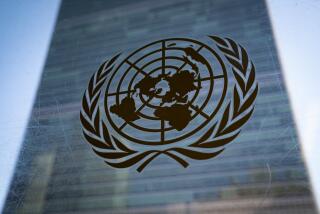U.N. official admonishes Karzai to enact reforms
- Share via
KABUL, AFGHANISTAN — The top United Nations official in Afghanistan on Thursday issued an unusually pointed warning to President Hamid Karzai to enact major political reforms or risk losing the support of the international community.
“There is a belief among some that the international commitment to Afghanistan will continue whatever happens because of the strategic importance of Afghanistan,” Kai Eide, the U.N. special representative, said at a news conference. “I would like to emphasize that this is not correct.
“It is public opinion in donor countries and in troop-contributing countries that decides the strength of that commitment,” Eide said, “and the debate we have seen over the last few weeks and months underlines that we are at a critical juncture.”
Underscoring the fragility of that commitment, U.N. officials said the world body was temporarily pulling hundreds of staff members out of Afghanistan while it reviews security arrangements after an attack last week on a guesthouse in Kabul, the capital, that killed five U.N. employees and three Afghans.
Most of the 1,100 foreign U.N. staff members live in similar accommodations, many of which are protected by a few local police guards and are no longer deemed safe.
The move raised questions about the U.N.’s ability to function amid an escalating Taliban insurgency.
U.N. officials emphasized that no more than 12% of the world body’s approximately 5,600 employees in the country would be relocated, most of them foreigners in support roles. Some will be moving to safer locations within Afghanistan; others will be sent elsewhere in Central Asia or to Dubai, United Arab Emirates. Officials hope they will be back in four to six weeks.
Eide’s remarks echoed recent warnings by President Obama and British Prime Minister Gordon Brown, whose governments need a credible partner in Kabul to justify sending more troops and other resources.
Eide went further, outlining steps Karzai’s administration should take to win back the trust of the international community and his own people after years of government corruption capped by a tainted election in August.
The first step would be to appoint a government of “competent, reform-oriented personalities,” Eide said. “We cannot afford any longer a situation in which warlords play their own games.”
During the election campaign, Karzai cut deals with regional strongmen who could deliver votes. Eide was especially critical of Karzai’s choice of a running mate: Mohammed Fahim, a former warlord accused of drug trafficking.
Eide also urged the new administration to draw up a “clear” and “unambiguous” program to tackle corruption, strengthen the judicial system, end the culture of impunity and improve capacity to deliver services, a program he said should be endorsed at an international conference in the first half of next year.
As Afghanistan prepares for parliamentary elections next year, he said, local officials should address government interference in the voting process and charges that the Independent Election Commission is biased in favor of Karzai.
These were the two main reasons given by former Foreign Minister Abdullah Abdullah for his decision to pull out of a runoff election against Karzai that had been planned for this weekend.
Eide also emphasized the need to avoid “undue international interference” in the election process. The relentless arm-twisting by the U.S. and its allies to persuade Karzai to accede to a second round hurt his standing among Afghans.
Karzai aides reiterated the president’s pledge this week to form an inclusive government and eradicate administrative corruption, but said the international community must also take responsibility for problems in some programs.
Meanwhile, accusations that nine civilians were killed by a rocket strike in the southern province of Helmand threatened to inflame anger against forces led by the North Atlantic Treaty Organization.
The rocket fired shortly before 7:30 p.m. Wednesday was aimed at a group believed to be planting a bomb near Babaji village, outside the provincial capital, Lashkar Gah, a military statement said.
The military said it was not aware of civilians in the vicinity but was investigating.
Hafizullah, an elder in the community, said the victims were three children and farmers working in a cornfield.
“I saw the bodies,” said Hafizullah, who, like many Afghans, uses only one name. “They were civilians.”
Dozens of angry villagers carried the bodies through the streets of the provincial capital before they were dispersed by police officers firing into the air, he said.
Karzai denounced the strike in a statement and said he had ordered the Interior Ministry to investigate.
Army Gen. Stanley A. McChrystal, the top U.S. and allied commander in Afghanistan, has ordered troops to take additional precautions to avoid civilian casualties.
Also Thursday, NATO-led forces announced that a U.S. service member died in an attack Wednesday in eastern Afghanistan.
--
Special correspondent Karim Sharifi in Kabul contributed to this report.
More to Read
Sign up for Essential California
The most important California stories and recommendations in your inbox every morning.
You may occasionally receive promotional content from the Los Angeles Times.













